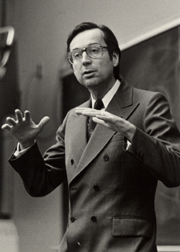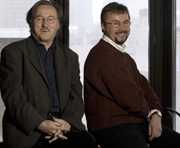
The late Robert Bourassa,
as seen in November 1978, when he came to Concordia to speak to the
students of Professor Alan Wright’s course in institutional administration.
Photo courtesy of Concordia Archives.

Professor Robert Comeau, of UQAM, and Guy Lachapelle, of Concordia,
are the co-organizers of the symposium Robert Bourassa, un bâtisseur
tranquille, taking place at both universities next week.
Photo by Andrew Dobrowolskyj
|
by Barbara Black
Professor Guy Lachapelle is trying to interest Concordia’s political
scientists in their own backyard.
He is a key co-organizer of Robert Bourassa, un bâtisseur tranquille,
a major examination of the late premier, to be held March 21 to 23 at
both Concordia and the Université du Québec à Montréal.
This is the first time that Concordia has been such an active participant
in the colloquium, now in its 14th year. Rector Frederick Lowy is on the
organizing committee, as is John Parisella, who is a member of Concordia’s
Board of Governors and was a Bourassa confidant.
Although other sessions take place at UQAM, the colloquium will open at
Concordia, in H-110 of the Hall Building, on Thursday, March 21, at 7
p.m. with a session on “The Robert Bourassa I knew.”
Prominent participants
The participants read like a who’s who of recent Quebec politics:
Jean Paré, editor of the influential magazine L’Actualité,
will be the emcee, with a panel that includes former cabinet ministers
Lise Bacon, Raymond Garneau and Paul Gérin-Lajoie, plus Le Devoir
editorialist Michel David, among others.
Lachapelle, who is also the secretary-general of the International Political
Science Association, says that Concordia students and faculty members
should take advantage of this opportunity to hear first-hand from people
who actually made Quebec history, or certainly watched it being made from
a unique vantage point.
He would like to see his colleagues engage more actively in research,
and the crucible of Quebec politics offers an ideal opportunity. Concordia’s
Department of Political Science has only one graduate program, the Master’s
in Public Policy and Administration (MPPA).
It is an enormously popular program, with 125 students currently enrolled.
In fact, Lachapelle said, the MPPA was launched at the initiative of the
Quebec government as a means of preparing anglophones for the civil service,
which is notoriously short of English-speaking employees. (The program
provides internships not only for the Quebec civil service, but for the
federal government and many other organizations.)
For the UQAM colloquium organizers, the subject of Robert Bourassa was
in the works for a while, Lachapelle said. For one thing, many of the
UQAM scholars were sour on the former premier because he supported the
Meech Lake Accord, a compromise on federalism that failed because of opposition
in both Quebec and English-speaking Canada.
Enough time has passed now for Bourassa to be considered a worthy subject,
and Lachapelle says that the former premier would probably have liked
the title of this event, which refers to him as a “quiet builder.”
Lachapelle’s co-organizer from UQAM, Professor Robert Comeau, said
that the colloqium was launched in 1987 by then UQAM rector Claude Corbo,
and has focused over the years on such notables as Jean Lesage (premier
from 1960-66 and architect of the Quiet Revolution), Georges-Émile
Lapalme (Quebec Liberal Party leader, 1950-58), André Laurendeau
(outstanding intellectual and journalist), Daniel Johnson (premier, 1966-68),
Thérèse Casgrain (feminist and socialist leader), and René
Lévesque (founder of the Parti Québécois and premier
from 1976-85).
Past colloquia have dealt with institutions as well as individuals, notably
the Mouvement Desjardins, Hydro-Québec, Le Devoir, the Conféderation
des Syndicaux Nationals (CSN), the Féderation des travailleurs
du Québec (FTQ) and the Montreal Urban Community.
Lachapelle says that future colloquia will look at former Montreal mayor
Jean Drapeau and Pierre Trudeau, political figures who still generate
strong interest among both anglophones and francophones, and he hopes
that Concordia scholars will be able to make a significant contribution.
For the full conference program, visit www.uqam.ca/Robert_Bourassa/.
|
|
|



